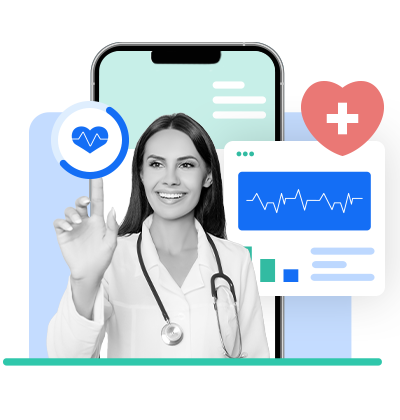Read More

Discover what’s next for AI in healthcare in 2026 - Get Access to the Full Report
On this page
- Healthcare App Development Overview
- Different Types of App Development for Healthcare
- Must-Have Features for Healthcare App Development
- Benefits of Building a Health App
- How to Build a Healthcare App?
- Healthcare App Development Challenges and Their Solutions
- Best Tech Stack for Digital Health App Development
- Healthcare App Development Cost Estimation
- How to Choose the Ideal Development Partner?
- Future of Healthcare App Development
- Take the Next Step with Radixweb!
On this page
- Healthcare App Development Overview
- Different Types of App Development for Healthcare
- Must-Have Features for Healthcare App Development
- Benefits of Building a Health App
- How to Build a Healthcare App?
- Healthcare App Development Challenges and Their Solutions
- Best Tech Stack for Digital Health App Development
- Healthcare App Development Cost Estimation
- How to Choose the Ideal Development Partner?
- Future of Healthcare App Development
- Take the Next Step with Radixweb!
Quick Sum Up - Healthcare app development transforms care delivery by offering personalized, on-demand digital solutions. This guide will help you explore the fundamentals of developing healthcare apps, emphasizing the key types, must-have features, development steps, cost estimation, and compliance requirements. It highlights the potential and challenges of apps, supporting healthcare providers, startups, and payers to develop scalable, user-friendly, and robust apps that streamline workflows and improve outcomes.
Digital transformation in healthcare has become imperative in this high-tech era. With the growing expectations of patients concerning on-demand, personalized care, healthcare systems are continuously facing cost pressures. This is why apps have now transformed from ‘just nice to have’ to ‘business-critical’. And indeed, after the pandemic, the need for telehealth and remote consultations accelerated several-fold, making healthcare app development the cornerstone of modern care delivery.
The global mHealth apps market is skyrocketing; you can expect it to be valued at around USD 88 billion by 2032. And the healthcare mobile application market might reach USD 1,070.58 billion by 2030, highlighting its unprecedented potential for rapid innovation and transformation.
At Radixweb, we’ve been at the forefront of this transformation, helping enterprise healthcare providers, clinics, and startups to design, develop, and deploy cutting-edge digital health solutions. From mental health and IoMT apps to remote monitoring systems, telehealth solutions, and enterprise-grade EHR platforms, we’ve helped clients to enhance patient engagement, simplify workflows, and deliver tangible impact.
Our experts have curated this guide to help you explore everything about building a health app, its types, key features, significance, challenges, costs, and Radixweb’s role in the overall development journey.
Healthcare App Development Overview: Types, Stakeholders, and Market Insights
App development for healthcare is the pillar of digital health transformation, fueling smarter, faster, and holistic patient care. But before starting with your development journey, it’s significant to understand what healthcare apps are, their end users, and the market opportunities and challenges.
What Is a Healthcare App?
A healthcare app is any mobile or web application designed and developed to improve patient engagement, simplify medical workflows, enhance health outcomes, and provide virtual healthcare services. Some popular types include:
- Patient-focused apps.
- Provider-focused apps
- Enterprise-level apps
- Domain-specific innovations
Key Stakeholders Involved
- Providers – Leverage digital tools to minimize administrative burden, optimize workflows, and deliver care.
- Patients – Ideal for end users who need convenience, reliable results, privacy, and usability.
- Insurers and Payers – Helpful in reimbursement processes, fraud prevention, and cost reduction.
- Caregivers or Family Members – Ideal for mental health, elderly care, and chronic disease.
Market Opportunities and Challenges
Opportunities -
- Growing demand for remote or virtual care.
- Rise in mobile or internet adoption, global smartphone utilization.
- Advances in cloud computing, AI, IoMT (Internet of Medical Things), and edge computing help with rich feature integrations.
- Regulatory environments have become compulsory to develop healthcare apps in different countries.
Challenges -
- Strict security protocols like GDPR in Europe, HIPAA in the USA, or regional rules.
- Healthcare app security and data privacy vulnerabilities.
- Interoperability with legacy infrastructures or existing solutions.
- Less tech readiness and user confidence.
- Costs of design, development, testing, and maintenance.
Different Types of App Development for the Healthcare Industry
Recently, we helped transform a basic wellness, mental health app idea into a user-centric, advanced app while integrating features like higher scalability, higher engagement, and insights. Basically, Brainlax is a healthcare mobile app focused on mental wellness and improving work performance. This transformation resulted in higher user adoption, affordability, increased downloads, and good ROI.
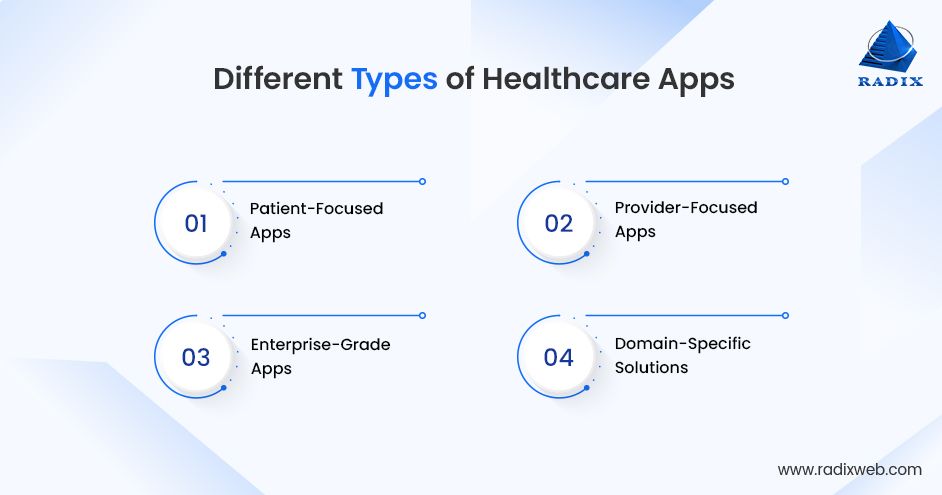
Well, this is not the only type of healthcare app we’ve developed; there are several other types too. So, before directly starting the development process, it’s crucial to identify the app type you want to build. The following are the significant types of healthcare apps you can choose from:
1. Patient-Focused Apps
These apps are built to empower users to take care of their health and boost patient engagement.
- Chronic Disease Management Apps – Monitors medical conditions like asthma, hypertension, and diabetes with real-time notifications.
- Telemedicine Apps – Helps with e-prescriptions, video calls, secure chat, and virtual consultations.
- Mental Health Apps – Guides with self-help content, habit tracking, therapy chatbots, and meditations.
- Fitness and Wellness Apps – Promotes preventive health and helps track your sleep cycle, diet, and workouts.
2. Provider-Focused Apps
Designed for healthcare professionals to improve workflow efficiency and clinical decision-making.
- EHR/EPR Systems – EHR and ERP healthcare systems make digital records seamlessly accessible from anywhere and interoperable with hospital platforms.
- Practice Management Tools – These apps help with staff coordination, patient flow, scheduling, and billing.
- Medical Reference Apps – Acquires drug databases, medical calculators, and clinical guidelines for quick reference.
3. Enterprise-Grade Apps
Large-scale digital solutions for enterprises, insurers, and health systems.
- Population Health Management – Integrates data analytics to track community health trends.
- Hospital Workflow Systems – These systems have features like reporting dashboards, staff assignment, bed calculation, and inventory management.
- Insurance and Claims Processing Platforms – Integrating health insurance software helps with payment tracking, fraud detection, and digital claims.
4. Domain-Specific Solutions
Developing these healthcare apps means merging advanced technologies that drive medical evolution.
- IoMT and Wearable Integrations – Helps with smart alerts and a continuous health data stream.
- AI-Driven Diagnostic Tools – AI healthcare app development helps with predictive analytics and image recognition for pathology and radiology.
- Virtual Reality (VR) / Augmented Reality (AR) – These domain-specific apps help with pain management therapy, patient education, and medical training.
- Remote Patient Monitoring (RPM) – These apps are used for chronic conditions or post-surgery care and provide real-time updates.
Must-Have Basic and Advanced Healthcare App Features
To build a successful healthcare app, you need an equilibrium between significant MVP features and advanced functionalities that stand out in the cutthroat market. Also, the features you integrate depend highly on your target audience, app objectives, budget and schedule, and compliance needs.
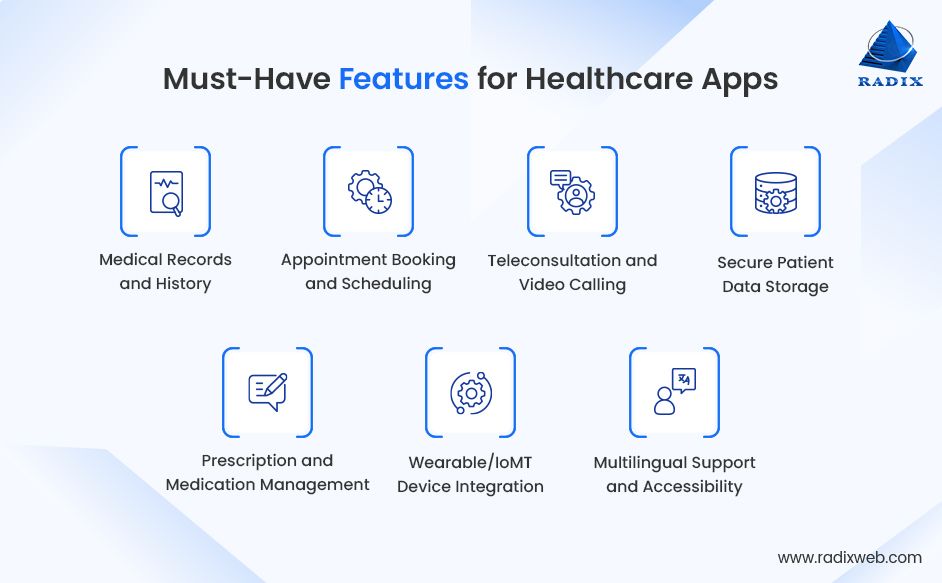
Basic Healthcare App Features
- Medical Records and History – This feature helps patients to securely access their health data, past consultations, and lab results.
- Appointment Booking and Scheduling – Simplify medical appointments with digital booking, reminders, and calendar sync.
- Teleconsultation and Video Calling – Helps with remote consultations, which minimizes patient travel and waiting periods.
- Secure Patient Data Storage – HIPAA compliance in healthcare apps enables interoperability with digital healthcare systems.
- Prescription and Medication Management – These features help with refill requests, dosage reminders, and digital prescriptions.
- Wearable/IoMT Device Integration – Helps sync the accumulated data from heart rate monitors, glucometers, and fitness trackers.
- Multilingual Support and Accessibility – Make apps dynamic for users from different nationalities and provide accessibility for those with special needs.
Advanced Healthcare App Features
- AI-Powered Symptom Checker and Predictive Analytics – Deploying AI in healthcare apps helps with personalized recommendations and early risk recognition.
- Cloud Storage and Data Backup – These features ensure fast access, better preparedness for disaster recovery, and scalability.
- Improved EHR Interoperability – Helps smooth integration with hospital systems using HL7/FHIR standards.
- Emergency Assistance – Enables patients to quickly contact emergency services or healthcare providers via geolocation support.
- Virtual Health Assistants – Integrated conversational AI that helps with scheduling, reminders, and FAQs.
- IoT Devices and Wearables Integration – Helps monitor patients' vitals in real time and alerts in case of abnormal readings.
- Advanced Security Measures – Integrates end-to-end encryption, multi-factor login, and biometric authentication.
- Custom Health Analytics Dashboards – It helps visualize patient progress, wellness trends, and goals.
Benefits of Healthcare App Development
Also, 71% of consumers prefer using a voice assistant to look for health-related information, while nearly 70% of healthcare professionals use telehealth or telemedicine platforms.
Today, both patients and healthcare providers embrace deploying and using healthcare applications for various significant reasons. Some of them are:
For Patients / End Users
- Personalized, Preventive Care – Early detection of any medical condition via predictive alerts, wearables, and AI.
- Better Engagement – Healthcare app development helps end users with wellness tracking, reminders, and personalized insights.
- Convenience and Access – You can schedule a doctor’s appointment remotely via an app, which reduces travel and saves time and money.
- Empowerment and Data Ownership – Provides seamless access to your medical data, medical history, and prescribed medication, and comes with the feature to share with healthcare providers.
For Healthcare Providers / Organizations
- Remote Consultations – Building a health app will help serve patients in underserved or remote areas much better, which further minimizes in-person load.
- Data-Driven Decision Making - Analytics from patient data and app usage helps improve workflows and personalize treatment plans.
- New Revenue Potential - SaaS licensing, wellness programs, telemedicine apps, and subscription models help with better revenue generation.
- Competitive Edge – Startups or new organizations can improve brand value, integration with a better technology stack, and build user trust.
- Enhanced Patient Engagement and Loyalty – Healthcare apps can improve patient satisfaction and retention rates.
- Operational Efficiency – Helps with seamless digital record-keeping, automated scheduling, customized dashboards, and minimal paperwork.
Step-by-Step Process to Build a Healthcare App
Healthcare app development is more about building a robust, intuitive, and compliant system that addresses real medical challenges. Here’s a comprehensive step-by-step process our experts follow to develop healthcare apps suited to different requirements:
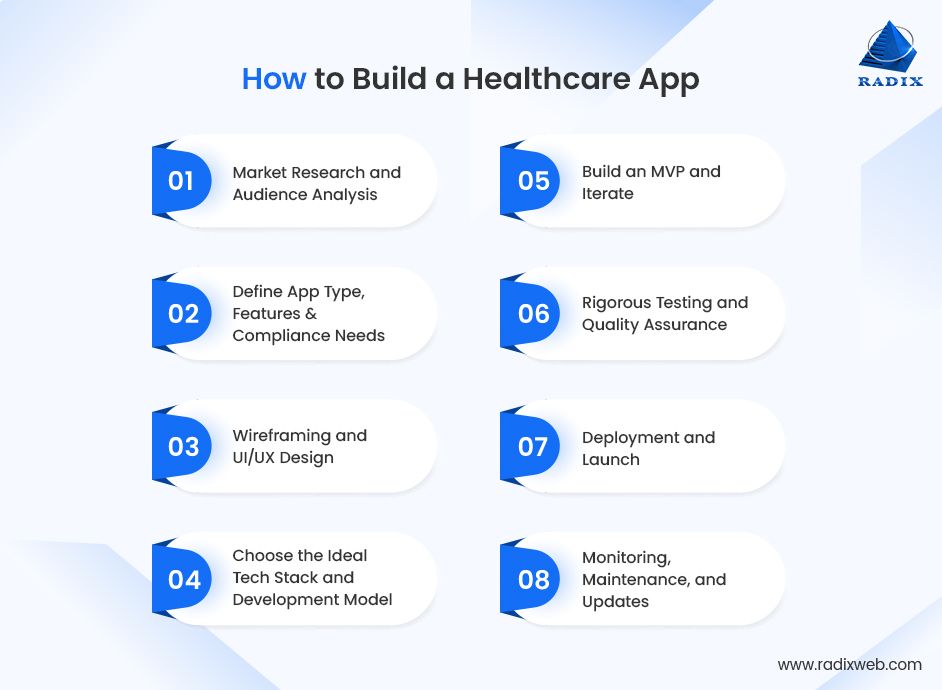
Step.1: Market Research and Audience Analysis
- Who’s your target audience? Are they healthcare organizations, insurers, hospitals, doctors, or patients?
- Examine your competitors thoroughly and look for the pain points.
- Research and integrate regulatory protocols like FHIR, HL7, GDPR, SOC2, and HIPAA compliance in healthcare apps to avoid expensive rework.
Step.2: Define App Type, Features & Compliance Needs
- Choose the type of healthcare app you want to build.
- Prioritize the ideal features (MVP) or advanced features for scalability.
- Outline compliance requirements to ensure patient privacy and data security.
Step.3: Wireframing and UI/UX Design
- Design wireframes to visualize user journeys and app screens.
- Create a clean, user-friendly interface here; intuitive navigation, multi-language support, and ADA compliance are critical.
Step.4: Choose the Ideal Tech Stack and Development Model
- Opt for a scalable tech stack like Flutter/React Native for cross-platform, Node.js for backend, and GCP/AWS for cloud.
- Decide between native, hybrid, or cross-platform app development depending on timelines and budget.
- Choose an agile development methodology for iterative builds.
Step.5: Build an MVP and Iterate
- Start by developing an MVP to test your healthcare app idea quickly.
- Gather user feedback and revamp the features before launching it on a full scale.
Step.6: Rigorous Testing and Quality Assurance
- Conduct performance, functionality, and usability tests.
- Also, focus on performing compliance tests.
- Solidify your app with the help of encryption validation and penetration testing.
Step.7: Deployment and Launch
- Launch on enterprise distribution platforms or app stores.
- Plan user boarding and marketing strategies to accelerate adoption.
Step.8: Monitoring, Maintenance, and Updates
- Consistently monitor the app performance, user reviews, and crash reports.
- Frequently update your app by integrating new features, security patches, and bug fixes.
- Scale your app architecture and infrastructure as the user base grows to maintain smooth performance.
Challenges in Healthcare App Development and Their Best Solutions
Digital health app development brings multiple advantages for stakeholders. However, developing these apps is not a cakewalk; it comes with specific healthcare challenges around cost, usability, security, and compliance. Here’s a quick breakdown of the most common obstacles we encountered and the strategies we employed to address them:
| Healthcare App Development Challenges | Our Solution |
|---|---|
| Integration with Existing Systems | Use data migration strategies, have a thorough plan for integrating EMR/EHR, deploy standard APIs, FHIR, and HL7 |
| Data Privacy and Security Risks | Conduct penetration testing, regular audits, ensure adherence to FDA, SOC2, GDPR, HIPAA; leverage encryption and authentication approaches |
| Cross-Platform Compatibility | Choose ideal cross-platform development frameworks carefully; ensure native look-and-feel and performance wherever required |
| Interoperability | Ensure easy sharing of data formats, scale APIs, use modular architectures, and industry standards |
| Cost and Time Overruns | Opt for Agile development, scope control, iterative MVP, and choose an experienced app development partner |
| Regulatory Compliance | Document everything, stay updated with changes in law, and also keep compliance experts in the loop from the start |
Best Tech Stack to Develop Healthcare App
To build cutting-edge healthcare apps, experts at Radixweb use these efficient, modern tools and tech stack:
- Backend – Java, .NET, Node.js, Python, particularly for AI/ML components
- Frontend – Cross-platform frameworks – React Native or Flutter, Native frameworks – Kotlin or Swift
- Cloud – Google Cloud, Azure, and AWS for storage, backups, and serverless computing
- Database - SQL, NoSQL, depending on the speed and structure of queries, like time series data, patient records from different devices
- AI / ML Frameworks – PyTorch, TensorFlow, predictive analytics, symptom checkers, and custom models
- Security / Compliance Tools – Secure APIs, encryption at rest/in transit, audit logging, and two-factor/multi-factor auth
- IoT / Wearables Integration – Device SDKs, synchronization,** buffer for offline, and managing live data streams
- Messaging/ Push/Notifications - Real-time notifications and secure messaging platforms
Estimating the Cost of Healthcare App Development
The cost of developing a healthcare app can fall anywhere between USD 30,000 and USD 500,000 or even more, depending on certain factors, including:
- The number of features and their complexity
- Regulatory compliance and security overhead
- Chosen platforms (iOS, Android, and Web)
- UX/UI design quality and accessibility features
- Payment, device SDKs, EHR software integration
- Team expertise and location
- App scalability
- Testing / QA / performance
Here is the rough estimate of app development cost for healthcare solutions:
- Simple Healthcare Apps - USD 30,000 – USD 80,000, which includes basic features like appointment scheduling and tracking.
- Mid-Complexity Healthcare Apps - USD 80,000 – USD 150,000+, which include advanced features like EHR integration and telemedicine.
- Enterprise-Grade Apps - USD 150,000 – 500,000 or more, which includes integration with AI, advanced analytics, IoT, and regulatory compliance.
How to Choose the Right Healthcare App Development Partner?
Collaborating with the ideal healthcare app development partner can make or break a project. The following is a checklist you need to follow when hiring the right service provider:
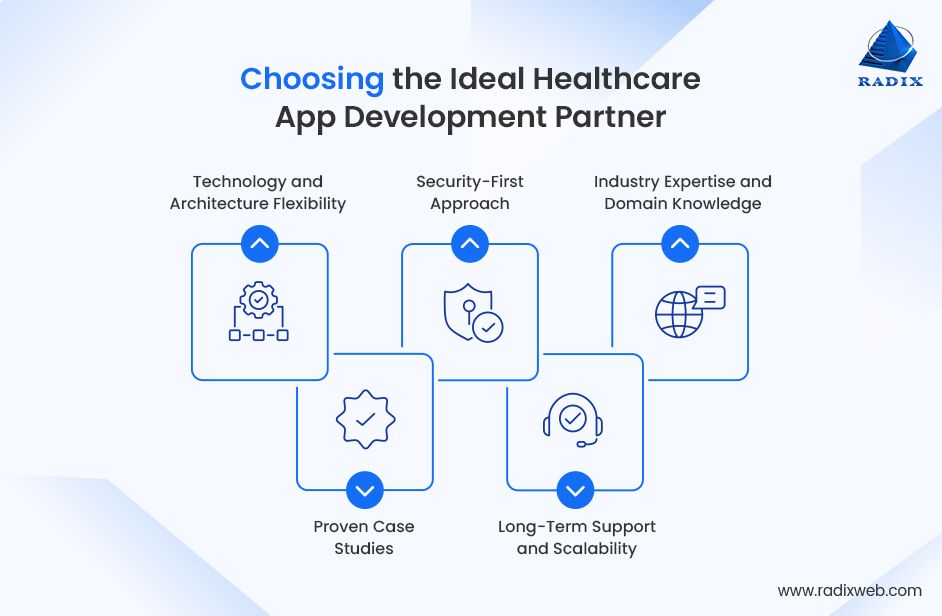
- Technology and Architecture Flexibility – Proficient in leveraging modern app architectures; capability to integrate AI, cloud, IoT, etc.; comes with cross-platform capability.
- Security-First Approach – Integrates encryption techniques, audits, and secure coding practices.
- Industry Expertise and Domain Knowledge – Do they have prior experience in developing healthcare projects? Can they integrate FDA, HIPAA, GDPR, etc.?
- Proven Case Studies – Go through their case studies concerning EHR/telehealth solutions or PowerApps healthcare apps. Also look for their proven implementation and outcomes.
- Long-Term Support and Scalability: - Provide consistent support for maintenance, upgrades, capability to scale as regulations and technologies change.
Future Trends in Digital Health App Development
Let's now go through some of the best technology advancements in healthcare that will propel the industry to evolve:
- Integrating AI/ML for chatbots, predictive alerts, diagnostics, and symptom checkers.
- Rising adoption of IoMT devices and wearables gathering live health data.
- Higher focus on data interoperability standards like HL7, FHIR.
- Telehealth and remote patient monitoring (RPM) is becoming de facto in the healthcare industry.
- Hybrid cloud and edge computing for offline or latency-sensitive situations.
- Prioritizing inclusive design, multilingual support, and accessibility.
- Low-code / no-code solutions allow rapid prototyping and deployment with the help of PowerApps-based tools.
Craft Next-Gen Healthcare Apps with Radixweb!Healthcare app development is now a key to delivering efficient, accessible, high-quality care. So, whether you’re a large healthcare organization looking for enterprise integration or a startup with an mHealth app idea, understanding the overall landscape, objectives, types, features, and costs, and collaborating with the right partner is imperative.And this is where Radixweb steps in! Led the way in the digital shift of the healthcare industry, we have evolved from developing basic apps to delivering cutting-edge, fully end-to-end solutions powered by IoT, AI, cloud, telehealth, and compliance protocols. Our expertise in developing modern healthcare apps helps us deploy functional as well as patient-centric, secure, and future-ready solutions.Teaming up with our experts means getting a dedicated team that understands your app vision, healthcare challenges, cutting-edge technologies, and regulatory landscapes. We help you build robust apps that boost patient engagement, enhance care delivery, and deliver tangible business outcomes – empowering you to outshine in the highly competitive digital health world.Consult our experts to know more about our healthcare app development services.
FAQs
What are the benefits of AI healthcare app development?
How to design a healthcare app?
Do app development for healthcare require FDA approval?
How long does it take to build a healthcare app?
What are some best practices to follow for building health apps?
Ready to brush up on something new? We've got more to read right this way.

